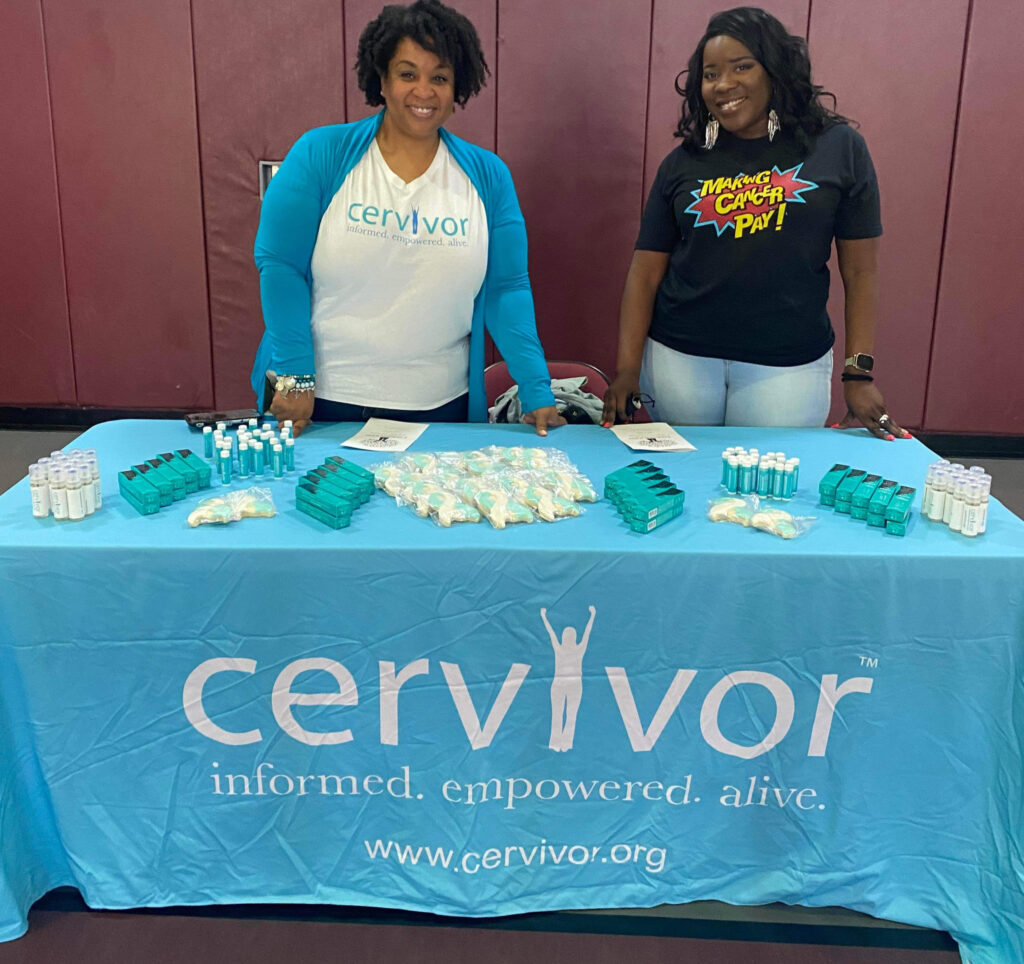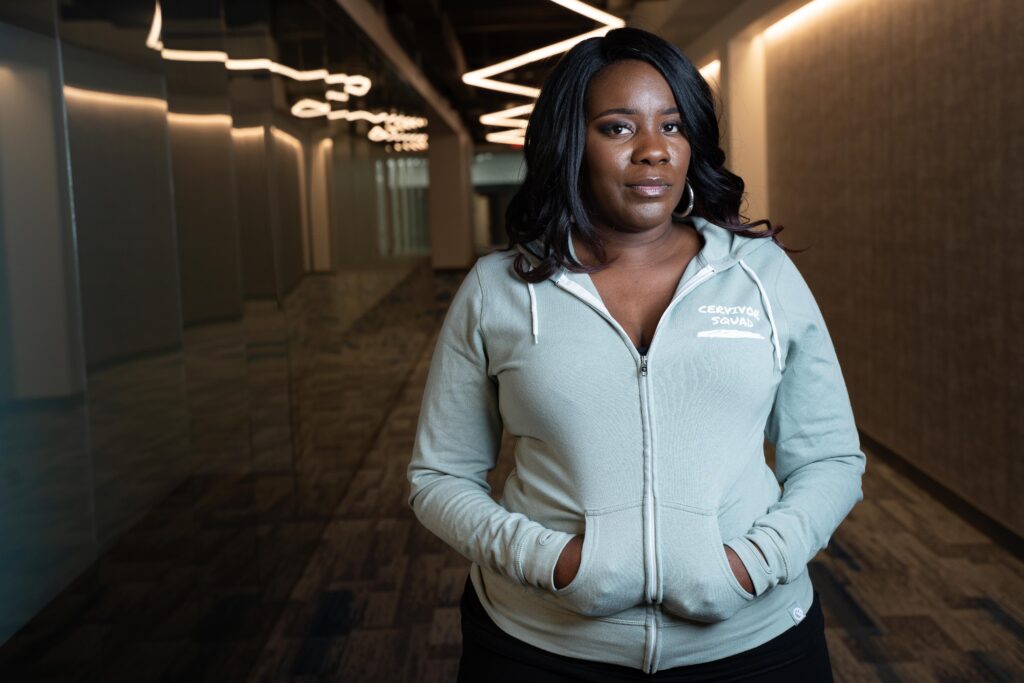I was informed I wouldn’t be able to carry children in the same appointment I was told my cervical cancer was Stage IIB at the age of 30. Luckily, my badass oncologist provided me with options to have biological children down the road via surrogacy. I immediately started IVF and froze nine healthy embryos.
Years later, when the concept of survival was on more solid ground, we began our surrogacy journey. We contacted an agency and learned the process. Long, grueling, and expensive, typically in the $80-$100,000 range. I’m sorry what? We moved forward because, simply, we were able to. So many women and loving couples don’t have this privilege.
Finding our surrogate was an arduous and awkward process. There is no manual for meeting someone that is going to carry your child. “Hi, we’re Kate and Matt. Can we put our baby inside of you? Here’s an orchid to show our appreciation of your consideration.”
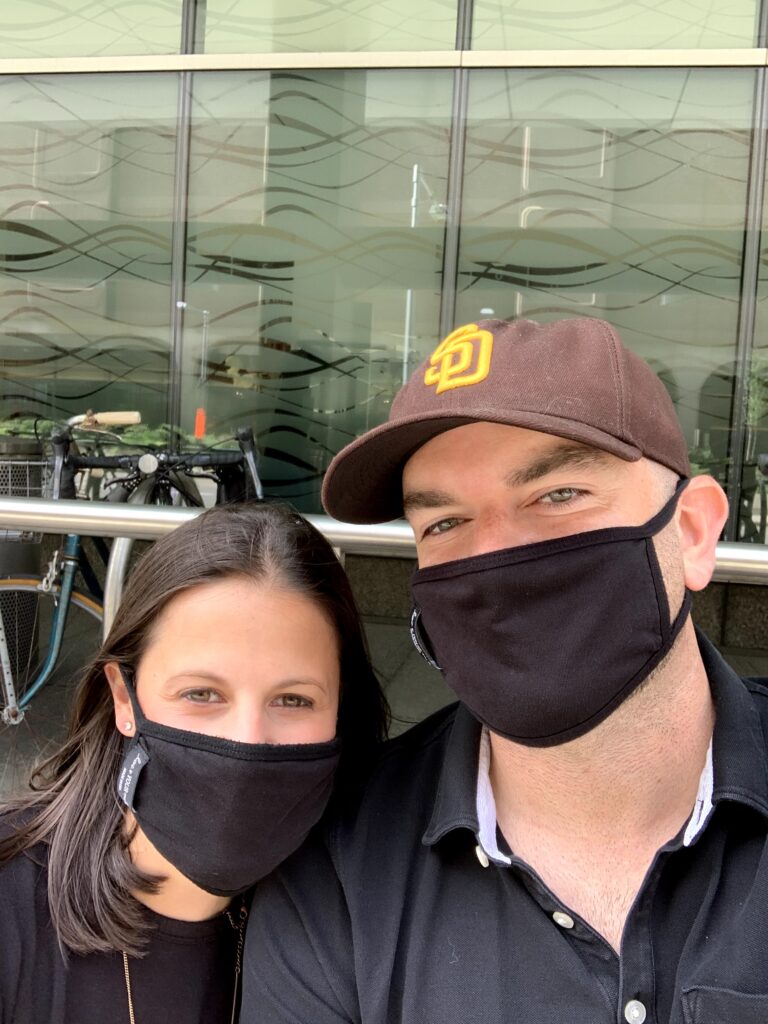
When we finally got matched with J, our surrogate whose name I’ll keep to just us, we were so relieved. A mom to three of her own and a foster mom, she is just a special woman. She was so sensitive to our situation. She had never been a surrogate before so we knew we would be stumbling through this together, but we had a tight bond from the get-go. We trusted each other. We always put each other first.
And that trust was tested when it was time for all the necessary legal protocols. Even though Massachusetts is a surrogacy-friendly state for both intended parents and surrogates, the legal process is extensive, to say the least. The lawyers propose endless scenarios you need to agree upon. The most trying topic for discussion is abortion or reduction if there are multiples, as you need to be aligned on all possible situations that may rise. Legally, J’s decisions would be the only one honored while she carried the fetus. We had no legal rights until the baby came out. Luckily, we were fundamentally aligned on decisions we would make if faced with these difficult circumstances. Other things to consider were how the birth would go, what we were comfortable with her doing or not doing during pregnancy, and then of course her payment structure.
Never did I think starting a family would require signing on so many dotted lines and having to rely on the ideologies of another woman to dictate how we would make decisions about our family. This is the reality of surrogacy. The experience is no longer just yours; it’s shared.
Once we finally got everything signed, J started IVF. Right before we started, there were rumblings about a global pandemic. At the time we didn’t understand the gravity, so we proceeded. But midway through our cycle, COVID-19 started taking more lives, and the world shut down. We made the heart-wrenching decision to stop everything. I broke down. We had been trying to start a family for 18 months at that point, and we were still so far from it becoming a reality. We consoled each other and just focused on protecting ourselves.
In July, IVF clinics began opening as studies were showing COVID-19 had minimal impact on a fetus. After agonizing over the decision, we started another cycle. We transferred two of our healthiest embryos, one boy and one girl. On transfer day, Matt and I met J outside the hospital and FaceTimed during the procedure. Most people get to have sex while making a baby. Us? A sterile waiting room at a hospital on FaceTime. Good times. J was incredible that day. She made us matching shirts and just kept saying, “This is going to happen!” We soaked in her optimism.
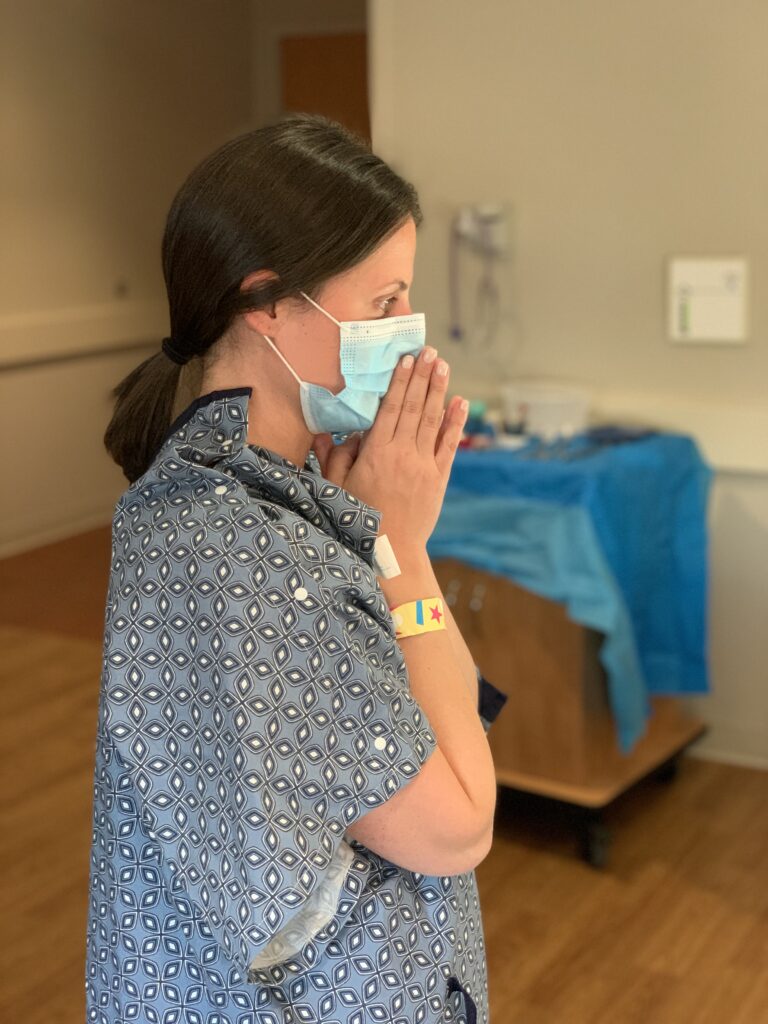
We began the dreaded “two-week wait.” I was so paralyzed with anxiety those two weeks it was hard to focus. There were also multiple pregnancy announcements among family and friends during that time too which was so wonderful and overwhelmingly difficult.
Because let me be very clear about something – when you’re in the thick of this and someone shares a pregnancy announcement with you, you feel everything. You’re happy. You’re gutted. You’re thrilled. You’re devastated. You feel every single emotion at the highest level. Very few people say it’s ok to feel this way. But I’m here to say it’s ok. You can be thrilled for the people you love while feeling devastated. We are humans with complex emotions, we aren’t robots. Feel everything. You’re not a terrible person. But maybe stay off social media. That’s my best advice.
Fortunately, at the end of the wait, we received amazing news. J was pregnant. We were pregnant. With twins? They didn’t know. We would have to wait for our scan. A few days later, J called to say she was bleeding. A lot. Our hearts stopped. The next day we went to the hospital for a scan, but with COVID protocols I wasn’t initially allowed in with her. J stood up to the security guards and proclaimed, “She’s coming with me, she’s the mother!” They let us through. I had never appreciated her more than in that moment.
With Matt on FaceTime in the parking lot, not with me holding my hand like how we normally face everything in life, we learned it was a hematoma which is very common with IVF. No major risk, but they would keep an eye on it. But then we also saw, for the first time, our baby. One baby. We felt a million things. Heartbroken one of the embryos didn’t take, thrilled one did. I just wanted to be with Matt. I felt horrible showing J my disappointment both didn’t take but then when we got back to the waiting room, she looked at me and said, “I was really hoping they both took for you.” I let the tears flow. She understood how momentous that moment was. It felt like a massive loss and victory all at once. I met Matt back in the parking lot and cried. But we were pregnant with a healthy singleton who we found out weeks later was a baby girl. And woah, that changed everything.
The next ten months were as wonderful as they were hard. What was it like having someone else carry my child? Surreal. The moment that babe became real to us, a primal instinct came over, and protecting her was all we cared about. But the fact that our protection could only go so far, as it was in the hands of someone else, was brutal. Zero control. Especially during a global pandemic. I had to trust her. Which of course I did but it wasn’t always easy. J was incredible about communicating, sending pics of her growing belly, and keeping us updated anytime Lou would kick or have hiccups. She texted me every morning from the line she waited in to get a smoothie, claiming Lou just really wanted one! It was difficult to hear from someone else what your daughter was up to or craving. We missed Lou and we didn’t even know her. Further, with COVID protocols, Matt couldn’t come into any of our appointments. He would wait in the parking lot and be on FaceTime or speaker phone. He never saw his daughter on the screen in real-time. Never heard her heartbeat in the doctor’s office. Never got to feel her kick in my belly. And our experience was so vastly different we didn’t always feel included in the mother or intended parent community. Even to this day, I feel isolated.
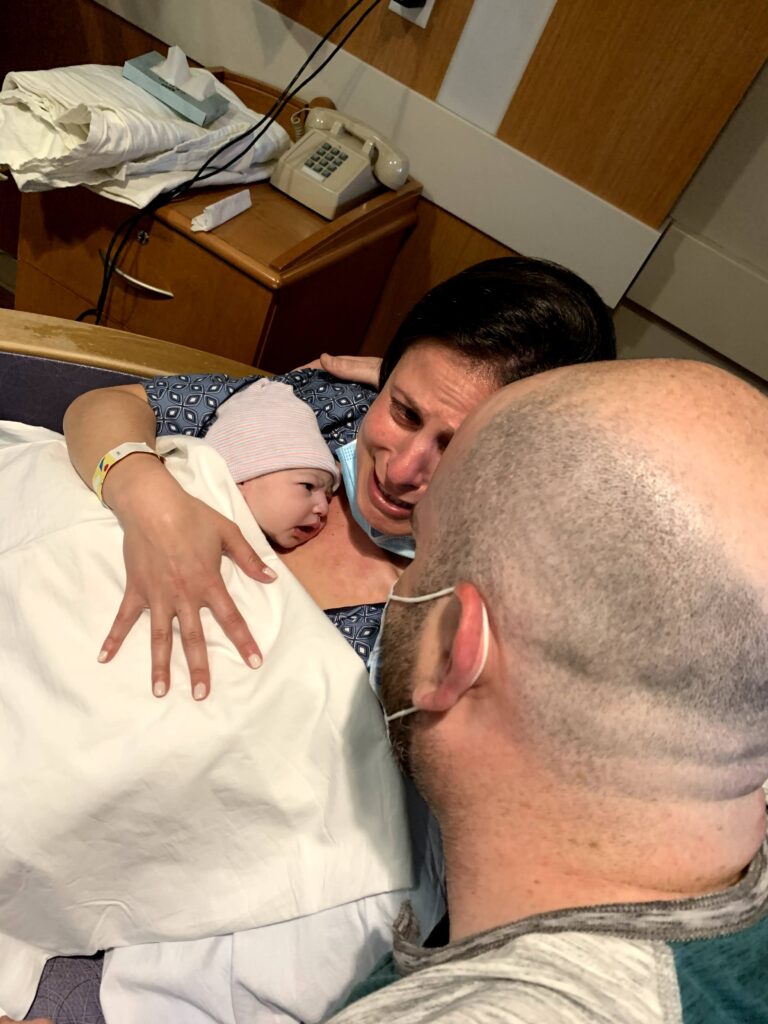
The time ticked closer to our delivery date. We decided to induce J so we didn’t risk missing the birth. We checked in at 7 am on a sunny day. J, her husband, and Matt and I hung out all day just waiting. It was a beautiful time. Finally, it came time for pushing. I believe that was the single hardest part of the surrogacy experience. I wanted to be the one pushing. Not the one sitting on the sidelines. When J struggled to get Lou out (she was sunny side up that little stinker), I just remember thinking that I should be the one struggling. That I should be the one fighting to get her out. I had zero control in that moment, and I wanted to crawl out of my skin. My daughter was right there, but so far away. Finally, after two hours of hard pushing, Lou was immediately placed in my arms (something that we had to legally agree upon) to start skin-to-skin. Matt and I locked eyes. He put his hands on his head in disbelief. We started sobbing. She was here. She was ours. We made it.
At the beginning of our journey, J had said to me, “You can only say thank you to me when that baby gets placed in your arms.” I looked at her and just kept saying over and over, “Thank you, thank you, thank you.”
Louella was magical. Carbon copy of Matt and all his relatives. It took us all a moment to bond and to get to know each other, I was so worried she wouldn’t be comforted by our voices. But she was. That girl knew she was ours from the first second she came Earthside. She took her bottle immediately. She tinkled all over me. She was so beautiful.
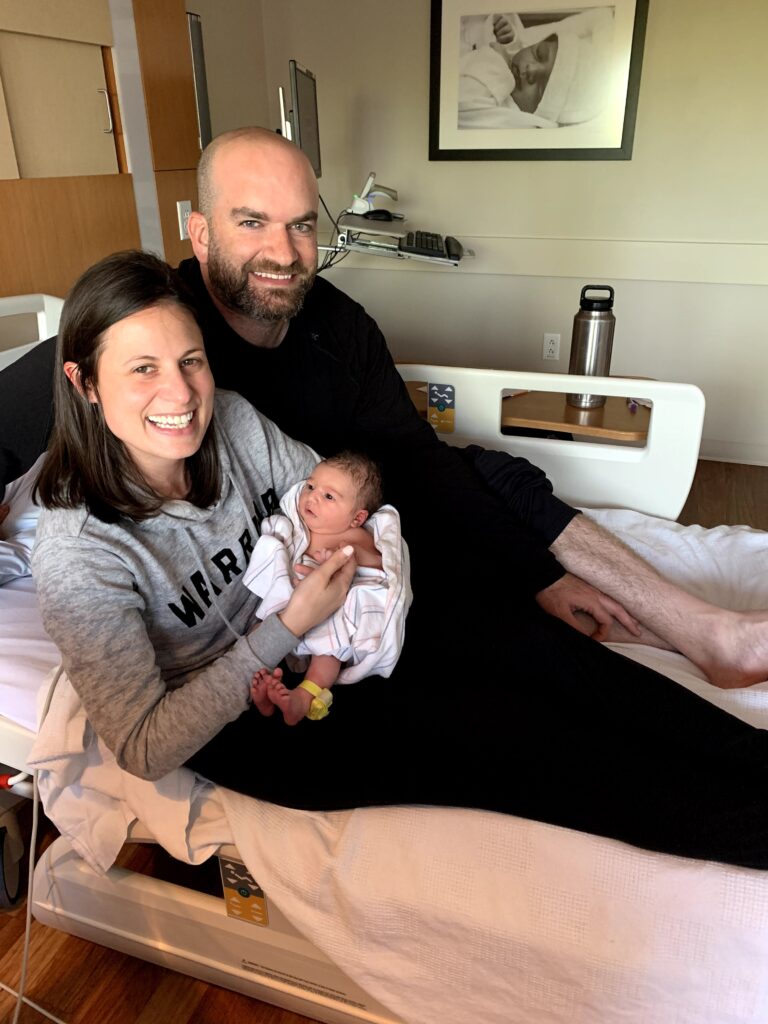
Not a single day with Lou is taken for granted. She turned two in May, and we are astounded by her intelligence, her curiosity, her hilarious one-liners, her curls, her love of drawing and scooting, her bravery, her everything. She’s everything.
The surrogacy journey is like surviving cancer. You are so happy you did but are angry you even had to. Cancer took so much from me, and the ability to carry children is certainly the most painful. But we just stay grounded in our gratitude as much as we can. We are so grateful for J. Grateful for my Cervivor sisters like Ginny who provided support during that time. Grateful for each other. Grateful for our family and friends who kept us going. Grateful for our doctors and medicine. Grateful for Lou, our light at the end of our tunnel.
If you’re in any part of this journey, beginning middle, or end, I’m here. We are all here. We know how hard this is. Feel everything but keep going. You’ll reach your light too.
Kate Weissman was diagnosed with stage II squamous cell carcinoma at the age of 30. She is a 2018 Cervivor School graduate, a Cervivor Ambassador, and a 2023 Cervivor Champion Recipient. Kate also serves as the Massachusetts State Lead Ambassador for the American Cancer Society Cancer Action Network (ACSCAN) where she lobbies to Congress for policies that would improve the lives of cancer patients and their families. She lives in Boston with her husband, their beautiful daughter Louella who was born via surrogacy after her treatment, and their fur baby Giada. She is the SVP of Operations at Weber Shandwick, and loves to read and cook!
